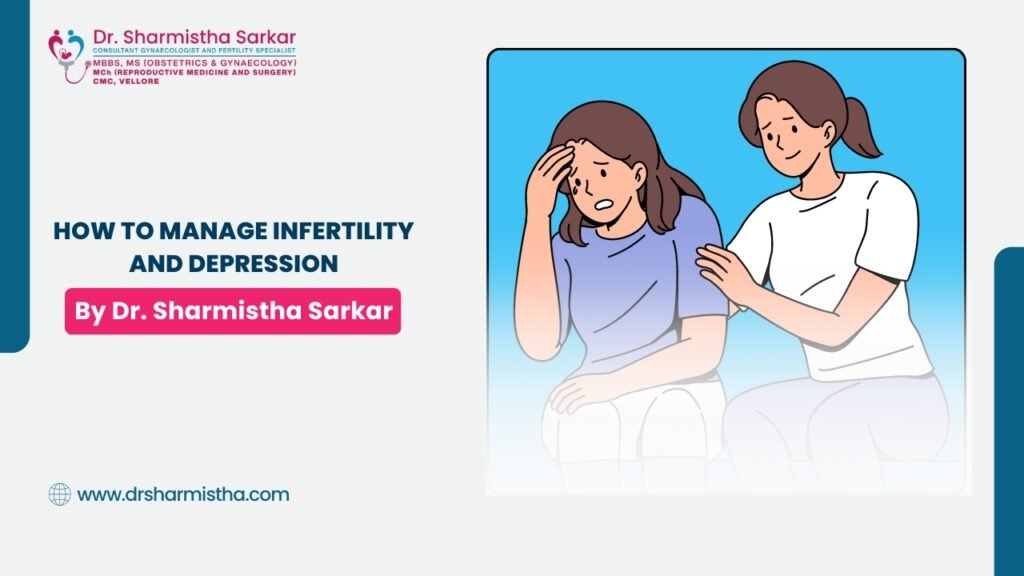PCOS and Infertility: Is It Possible to Have a Baby?
Polycystic Ovary Syndrome (PCOS) is a common hormonal issue that affects women of childbearing age. It often causes hormonal imbalance, making it difficult for a woman to conceive. This blog explains how PCOS can impact fertility and explores available treatment options. 1. What is PCOS? Definition of PCOS: PCOS is a condition where the ovaries produce excess of male hormones . It affects 5-10% of women of reproductive age worldwide. Common Symptoms and Characteristics: Irregular Periods: Menstrual cycles that are infrequent or prolonged. High Androgen Levels: Excess male hormones leading to acne, unwanted hair growth, and hair thinning. Polycystic Ovaries: Ovaries may be enlarged with small cysts, which can prevent eggs from being released regularly. Impact on Menstrual Cycle, Hormones, and Ovaries: PCOS causes a hormonal imbalance that disrupts the menstrual cycle. This can lead to irregular periods and may prevent the ovaries from releasing eggs regularly, making it harder to get pregnant. 2. What is Infertility? Infertility is when a couple cannot conceive after trying for one year without birth control. It can be due to problems in either partner or both. In women, conditions like PCOS can make it difficult to conceive. 3. PCOS and Infertility:- Statistics on PCOS and Infertility: Around 70-80% of women with PCOS experience difficulties with getting pregnant due to irregular ovulation. However, many can conceive with right guidance and treatment. What are the odds of getting pregnant with PCOS? The impact of PCOS on fertility varies. Women with milder symptoms and a healthy lifestyle may have an easier time conceiving, while others may require medical intervention. 4. How Does PCOS Cause Infertility? Hormonal Imbalances Affecting Ovulation:PCOS alters hormone levels, making it harder for the ovaries to release a mature egg, which is necessary for pregnancy. Impact on Egg Quality and Irregular Menstrual Cycles:Irregular periods mean less frequent ovulation and, potentially, lower-quality eggs, complicating efforts to conceive. Insulin Resistance and Its Role in Fertility:Many Women with PCOS have insulin resistance and higher levels of male hormones, as a result the ovaries fails to ovulate. Implantation issues: In many women with PCOS,there is disordered growth of endometrium(lining of uterus), due to unopposed action of only estrogen hormone and absence of progesterone hormone in the endometrium.This causes failure of implantation of the embryos. Chronic Inflammation: Ongoing low-level inflammation can also impact fertility. 5. What Are the Treatment Options for PCOS-Related Infertility? Lifestyle Changes: Diet, Exercise, and Weight Management: Diet: Eating a balanced diet low in refined sugars can help manage insulin levels. Exercise: Regular activity helps improve overall health and hormonal balance. Weight Management: Loosing 5-10% of body weight can improve ovulation in overweight women with PCOS Hormonal Treatments: Clomiphene (Clomid): Helps stimulate ovulation. Letrozole: Another medication that can help with ovulation. Metformin: Improves insulin sensitivity, which can help restore regular cycles. Gonadotropins: Hormonal injections that causes follicular development in the ovaries. Assisted Reproductive Technologies (ART): In Vitro Fertilization (IVF): Eggs are fertilized outside the body and then implanted in the uterus. Surgical Options: Ovarian Drilling, if Necessary: A laparoscopic surgery that can help some women with PCOS to ovulate by reducing the number of cysts in the ovaries. Holistic Approaches: Yoga, Acupuncture, and Mental Well-Being: Yoga and Acupuncture : Can help reduce stress and improve hormonal balance. Mental Well-Being : Managing stress and anxiety can improve overall fertility health. Although PCOS can make it harder to get pregnant, it is possible to have a baby with the right treatment and support. Understanding PCOS and its impact on fertility is key to finding effective solutions. With lifestyle changes, medical treatment, and sometimes assisted reproductive technologies, many women with PCOS can successfully conceive. Dr. Sharmistha Sarkar MBBS, MS (Obstetrics & Gynaecology), MCh(Reproductive Medicine and Surgery), CMC, Vellore Contact Us Today
PCOS and Infertility: Is It Possible to Have a Baby? Read More »





